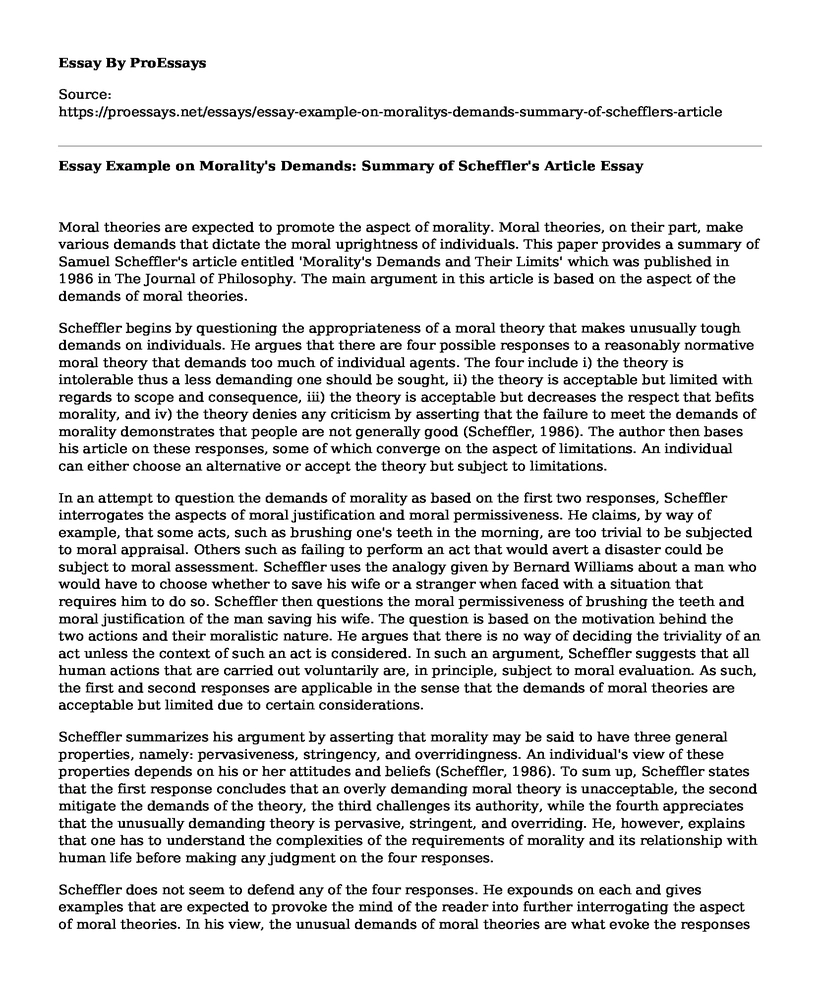Moral theories are expected to promote the aspect of morality. Moral theories, on their part, make various demands that dictate the moral uprightness of individuals. This paper provides a summary of Samuel Scheffler's article entitled 'Morality's Demands and Their Limits' which was published in 1986 in The Journal of Philosophy. The main argument in this article is based on the aspect of the demands of moral theories.
Scheffler begins by questioning the appropriateness of a moral theory that makes unusually tough demands on individuals. He argues that there are four possible responses to a reasonably normative moral theory that demands too much of individual agents. The four include i) the theory is intolerable thus a less demanding one should be sought, ii) the theory is acceptable but limited with regards to scope and consequence, iii) the theory is acceptable but decreases the respect that befits morality, and iv) the theory denies any criticism by asserting that the failure to meet the demands of morality demonstrates that people are not generally good (Scheffler, 1986). The author then bases his article on these responses, some of which converge on the aspect of limitations. An individual can either choose an alternative or accept the theory but subject to limitations.
In an attempt to question the demands of morality as based on the first two responses, Scheffler interrogates the aspects of moral justification and moral permissiveness. He claims, by way of example, that some acts, such as brushing one's teeth in the morning, are too trivial to be subjected to moral appraisal. Others such as failing to perform an act that would avert a disaster could be subject to moral assessment. Scheffler uses the analogy given by Bernard Williams about a man who would have to choose whether to save his wife or a stranger when faced with a situation that requires him to do so. Scheffler then questions the moral permissiveness of brushing the teeth and moral justification of the man saving his wife. The question is based on the motivation behind the two actions and their moralistic nature. He argues that there is no way of deciding the triviality of an act unless the context of such an act is considered. In such an argument, Scheffler suggests that all human actions that are carried out voluntarily are, in principle, subject to moral evaluation. As such, the first and second responses are applicable in the sense that the demands of moral theories are acceptable but limited due to certain considerations.
Scheffler summarizes his argument by asserting that morality may be said to have three general properties, namely: pervasiveness, stringency, and overridingness. An individual's view of these properties depends on his or her attitudes and beliefs (Scheffler, 1986). To sum up, Scheffler states that the first response concludes that an overly demanding moral theory is unacceptable, the second mitigate the demands of the theory, the third challenges its authority, while the fourth appreciates that the unusually demanding theory is pervasive, stringent, and overriding. He, however, explains that one has to understand the complexities of the requirements of morality and its relationship with human life before making any judgment on the four responses.
Scheffler does not seem to defend any of the four responses. He expounds on each and gives examples that are expected to provoke the mind of the reader into further interrogating the aspect of moral theories. In his view, the unusual demands of moral theories are what evoke the responses and attitudes towards morality. People tend to behave in consideration of their well-being. Therefore, interrogations and consequent choices will always arise whenever a moral theory seems too demanding.
References
Scheffler, S. (1986). Morality's demands and their limits. The Journal of Philosophy, 83(10), 531-537.
Cite this page
Essay Example on Morality's Demands: Summary of Scheffler's Article. (2023, May 08). Retrieved from https://proessays.net/essays/essay-example-on-moralitys-demands-summary-of-schefflers-article
If you are the original author of this essay and no longer wish to have it published on the ProEssays website, please click below to request its removal:
- Research on Identity
- Essay Example on Sales and Marketing Ethics
- Paper Example on Psychologists: Ethical Guidelines for Professional Practice
- Essay Example on Essential Life Knowledge: Don't Neglect or Risk Dire Consequences
- Essay Example on Nietzsche's Critique of Morality: Analysis of Its Impact on Humanity
- Essay Exaxmple on Ethics & Corporate America: Utilitarianism & Social Standards
- Essay Sample on IRB: Safeguarding Human Research Participants







